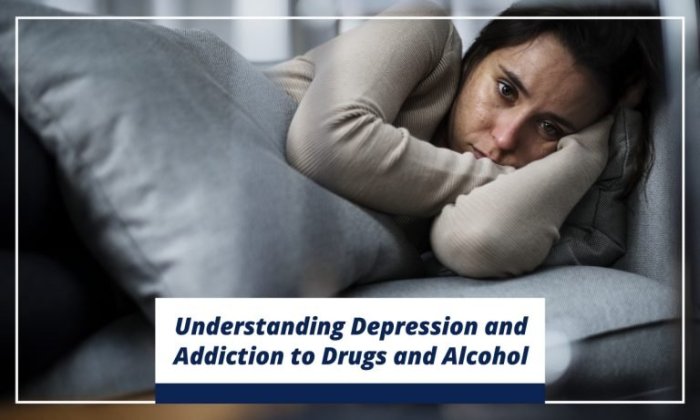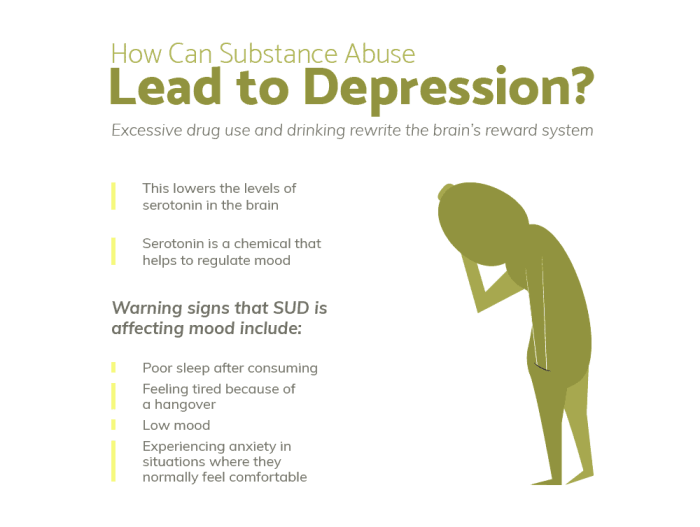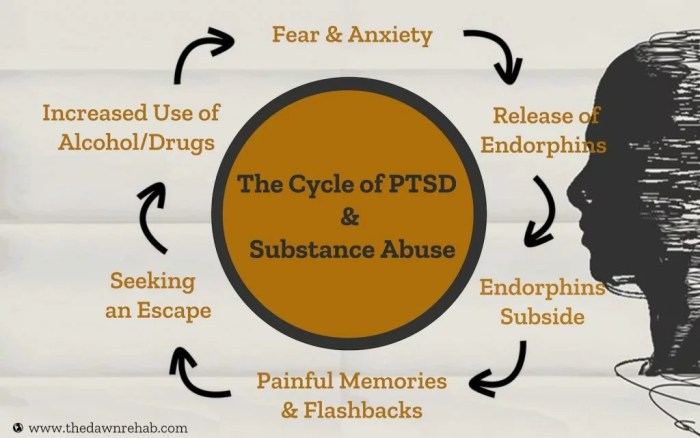Depression and substance use disorders are two common and often co-occurring mental health conditions that can have a significant impact on an individual’s life. This article will provide an overview of these disorders, including their symptoms, risk factors, and treatment options.
Depression is a mood disorder that causes feelings of sadness, hopelessness, and worthlessness. It can also lead to changes in appetite, sleep, and energy levels. Substance use disorders are characterized by compulsive use of drugs or alcohol despite negative consequences.
These disorders can lead to addiction, health problems, and relationship difficulties.
Depression and Substance Use Disorders
Depression and substance use disorders are common and debilitating mental health conditions that often co-occur. Depression is characterized by persistent sadness, loss of interest in activities, and other symptoms that interfere with daily life. Substance use disorders involve the compulsive use of drugs or alcohol, leading to significant impairment in various areas of functioning.
Overview of Depression and Substance Use Disorders

Depression and substance use disorders are distinct but often co-occurring mental health conditions. Depression is a mood disorder characterized by persistent sadness, loss of interest in activities, and other symptoms that interfere with daily life. Substance use disorders involve the compulsive use of drugs or alcohol, leading to significant impairment in various areas of functioning.
The prevalence of depression and substance use disorders is high, with a significant number of individuals experiencing these conditions at some point in their lives. The co-occurrence of these disorders is also common, with a substantial proportion of individuals with depression also struggling with substance use problems.
Examples of commonly abused substances in relation to depression include alcohol, opioids, and stimulants. These substances can provide temporary relief from the symptoms of depression, but their use can ultimately worsen the condition and lead to addiction.
Risk Factors for Depression and Substance Use Disorders

The development of depression and substance use disorders is influenced by a complex interplay of genetic, environmental, and psychological factors.
- Genetic factors:Certain genetic variations have been linked to an increased risk of developing depression and substance use disorders.
- Environmental factors:Childhood trauma, stressful life events, and social isolation can contribute to the development of these disorders.
- Psychological factors:Negative thinking patterns, low self-esteem, and difficulty coping with stress can increase the risk of depression and substance use.
Substance use can also increase the risk of developing depression. The use of drugs and alcohol can alter brain chemistry and disrupt neurotransmitter systems, leading to changes in mood and behavior.
Trauma and adverse life events play a significant role in the development of both depression and substance use disorders. Individuals who have experienced trauma or abuse are more likely to develop these conditions as a way of coping with the emotional distress.
Symptoms of Depression and Substance Use Disorders
Depression is characterized by a persistent low mood, loss of interest in activities, and other symptoms that interfere with daily life.
- Low mood:Feeling sad, down, or hopeless most of the time.
- Anhedonia:Loss of interest or pleasure in activities that were once enjoyable.
- Cognitive impairments:Difficulty concentrating, making decisions, or remembering things.
- Sleep disturbances:Insomnia or excessive sleepiness.
- Changes in appetite:Significant weight loss or gain.
- Fatigue:Feeling tired or lacking energy most of the time.
- Suicidal thoughts:Thoughts of death or suicide.
Substance use disorders are characterized by compulsive drug or alcohol use, leading to significant impairment in various areas of functioning.
- Tolerance:Needing to use more of the substance to achieve the same effect.
- Withdrawal:Experiencing unpleasant symptoms when the substance is stopped or reduced.
- Impaired control:Difficulty limiting or stopping substance use.
- Neglect of responsibilities:Failing to meet obligations at work, school, or home due to substance use.
- Continued use despite negative consequences:Continuing to use the substance even though it is causing problems in relationships, health, or other areas of life.
Summary

Depression and substance use disorders are serious mental health conditions that can have a devastating impact on an individual’s life. However, there is hope. With the right treatment, individuals can recover from these disorders and live full and productive lives.
Commonly Asked Questions
What are the symptoms of depression?
Symptoms of depression can include feelings of sadness, hopelessness, and worthlessness. It can also lead to changes in appetite, sleep, and energy levels.
What are the symptoms of substance use disorders?
Symptoms of substance use disorders can include compulsive use of drugs or alcohol despite negative consequences. These disorders can lead to addiction, health problems, and relationship difficulties.
How are depression and substance use disorders treated?
Treatment for depression and substance use disorders typically involves a combination of therapy, medication, and lifestyle changes.